"Did TV networks overdo it by airing bloody scenes of Gaddafi's death?"
The headline said it all in a lead article in the pan-Arab daily Asharq Al-Awsat's media supplement Thursday.
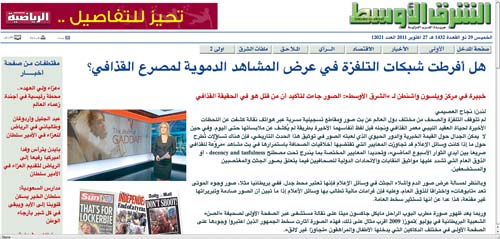
Screen shot of Asharq Al-Awsat's lead media story on Gaddafi's bloody end
"While one cannot dispute the news value and vital role the pictures played in documenting this historic event, questions are being raised about whether the media exceeded ethical standards by endlessly broadcasting 'horrendous scenes of a bloodied (former Libyan leader Muammar) Gaddafi at the hands of rebels last week'," the paper reported.
It added that issues of "decency and tastefulness" long featured in international media ethics codes or professional standards guidelines regarding photos of corpses, rape victims and victims may well have been breached.
It's an important question that ethicists raise repeatedly when media cover wars, conflicts or scenes of bloody battles.
Article 19's director Agnès Callamard reflected on the matter, saying: "This is a summary execution. It has spoiled justice, denied the world accountability and undermined due exercise of our right to know."
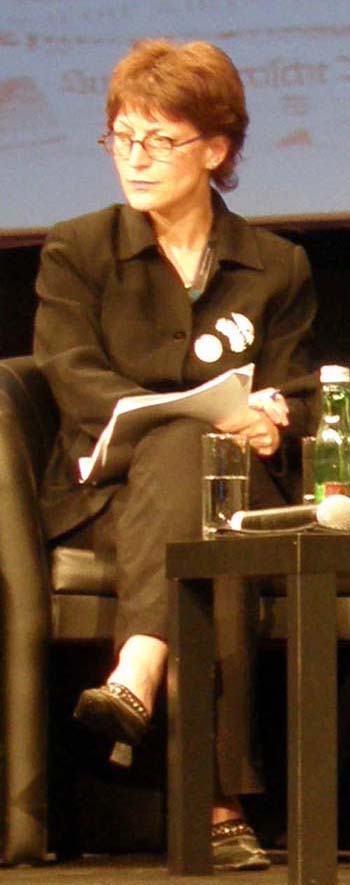
Article 19's Agnès Callamard (Abu-Fadil)
It was also one of several thorny topics covered during a panel I chaired on "How to tell the truth during a revolution?" at the 18th World Editors Forum/63rd World Newspaper Congress in Vienna, days before Gaddafi was captured and killed.
Can media be ethical under pressure of deadlines, and when they're unable to deploy their news teams in conflict zones, as has been the case in Syria? How can one verify the pictures and video clips sent to news organizations or posted online as being genuine?
Panelist Hoda Abdel-Hamid, a roving correspondent for Aljazeera's English TV channel, had just arrived from Sirte, was planning to go back to cover news in Libya, and told me how difficult it was to authenticate information she got from pro- and anti-Gaddafi sources.
"It's a very complicated situation in Libya," she said, adding that Aljazeera was either treated as royalty or hated by various fighting factions, and, that one of the channel's cameramen was murdered on assignment there.
She also said there was a lot of lying, notably from the anti-Gaddafi forces, but misleading claims couldn't be ignored by reporters whose job it was to provide the proper context and frame the issues in a way that helped the audience understand the story.
The Qatar-based channel had been charged with staging news in its own studios to replicate NATO attacks on Gaddafi's Tripoli stronghold at Bab Al-Azizia, a charge Aljazeera has denied.
The Egyptian revolution that began on January 25 has also been chock-full of incidents testing media ethics, most particularly state-run TV's misleading coverage of unfolding events by airing footage of peaceful streets when all hell was breaking loose in many Cairo neighborhoods and major cities like Alexandria.
It led then Nile TV reporter Shahira Amin to resign when her bosses asked her to distort the facts.
Amin moderated the conference's annual press freedom round table that grouped Agnès Callamard, Guy Berger, UNESCO's new director for freedom of expression and media development, and Egyptian Gamal Eid, a lawyer with the Arabic Network for Human Rights Information, to name a few.
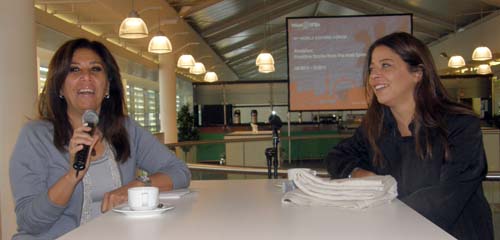
(L-R) Shahira Amin and Hoda Abdel-Hamid (Abu-Fadil)
Amin and Abdel-Hamid also regaled participants at a breakfast gathering entitled "Frontline stories from the Arab Spring" with revolution coverage details.
For Philippe Massonet, global news director at Agence France-Presse, juggling information from countless revolutions in the Arab World has been daunting and the old adage that "truth is often the first casualty of wars" holds true in journalists' work.
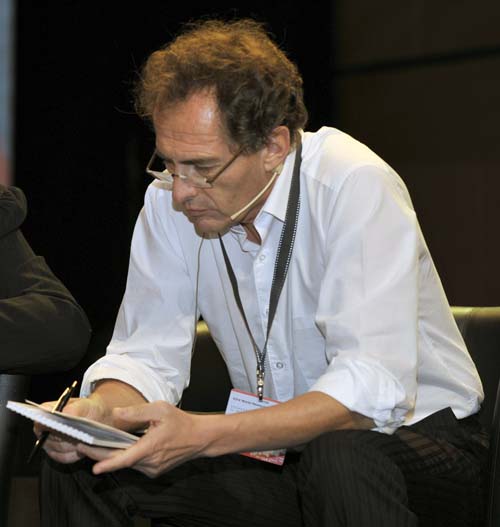
AFP's Philippe Massonet (courtesy of Philip Rusch)
Massonet admitted it was difficult to get the truth from warring factions on so many fronts in the Middle East/North Africa region.
"For a journalist, there's a simple first principle: trust your own eyes," he said, adding it was essential for news organizations to have their own people on-site.
While social media is very important for AFP in places like Syria, all news media have a responsibility to be there 24/7, he stressed.
He was asked how the agency handled security issues with complaints that foreign correspondents were often equipped with heavy-duty flak jackets and helmets whereas local staffers were not.
"That's not a fair statement for my organization," he said, noting that correspondents had to be psychologically balanced. "Safety, security are one of the main, key issues -- if you don't give them safety, security, they can't work properly."
Additionally, what happens to foreign correspondents who rely on local fixers/translators or staffers who may have their own biases and bend the truth to suit their needs?
"We rely on the bureaus we have in the Middle East and North Africa. We have Arabic speakers, and the network is very important," he said of people on the ground familiar with local conditions and who abide by AFP's guiding principles of accuracy, context and balance.
For panelist Gamal Eid, who was jailed during ousted president Hosni Mubarak's 30-year rule and admitted he had an agenda as an activist, there were only two choices: to side with the dictator, or with the people and democracy.
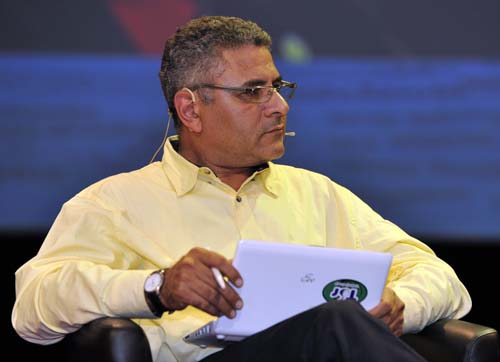
ANHRI's Gamal Eid (courtesy of Philip Rusch)
"It's very hard for us to believe any journalist or writer when he says 'I'm neutral,' between the dictatorship and democracy," he said.
Journalists who try to work professionally under any dictatorship will be jailed, Eid explained, noting that the whole Arab World was akin to a big prison.
So, the work of good journalists, bloggers and cartoonists in such countries means they should support democracy, he said.
"I don't support the journalists themselves, I support the right of society to know, to learn, to have access to information" he said.
Eid believes journalists act as mirrors for society and lauded efforts to disseminate news when Egyptian authorities alternated the shutdowns of mobile phone networks and the Internet. This allowed activists like him to report on the state's abuses by varying their tools and tactics.
